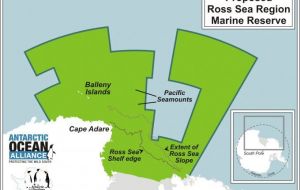MercoPress. South Atlantic News Agency
Creation of Antarctica marine protected areas blocked by China and Russia
 “Appalling attitude” from China and Russia ignoring majority of CCAMLR, said Mark Epstein, from Antarctic and Southern Ocean Coalition (ASOC).
“Appalling attitude” from China and Russia ignoring majority of CCAMLR, said Mark Epstein, from Antarctic and Southern Ocean Coalition (ASOC).  A joint US-NZ proposal to designate a Ross Sea MPA of 1.32 million km2 (with 1.25 million km2 area proposed as “no take”) was under consideration
A joint US-NZ proposal to designate a Ross Sea MPA of 1.32 million km2 (with 1.25 million km2 area proposed as “no take”) was under consideration The Commission for the Conservation of Antarctic Marine Living Resources (CCAMLR) has again failed to agree to protect key areas in the Ross Sea and East Antarctica at its annual meeting in Hobart due to blocking by China and Russia. The partners of the Antarctic Ocean Alliance (AOA) said that this failure to reach consensus for the fourth time calls into question CCAMLR’s ability to deliver on its conservation commitments.
Two proposals for the protection of the Ross Sea and East Antarctic coastal region were on the table at this week’s meeting, but final consensus from the 24 nations and the EU that makes up CCAMLR membership was actively blocked by China and Russia.
“It is appalling that while the majority of CCAMLR Members are more than ready to create significant marine protection in Antarctic waters, China and Russia have again blocked all efforts to negotiate a successful outcome,” said Mark Epstein, Executive Director of the Antarctic and Southern Ocean Coalition (ASOC).
“We commend the efforts of the United States, New Zealand, Australia, the European Union and France during the last four years to promote solid Antarctic marine protected proposals in Antarctica, and we hope they continue to demand the urgent protection required for Southern Ocean ecosystems. Despite the continuing challenges, it has been encouraging to see the strong support for the MPAs from fishing countries like Korea and Norway, which we welcome.”
“The question of whether CCAMLR can deliver on its conservation mandate is in very serious doubt after another disappointing failure at this year’s meeting,” said Richard Page, Greenpeace. “This year's failure denigrates the reputation of CCAMLR and is symptomatic of a dangerous global trend where geopolitical interests override any genuine efforts to protect the oceans for the sake of future generations.”
“Since 1959, Antarctica has been recognized as a special place for peace and science. It is regrettable that CCAMLR, faced with the objections from Russia and China, cannot live up to that promise,” said Andrea Kavanagh, who directs Pew’s efforts to protect penguins and the Southern Ocean. “Another year of inaction means another year that these near-pristine waters and their remarkable biodiversity are open to the threat of industrial fishing. The proposed designations would have ensured the long-term protection of many species, including penguins, seals and whales.”
A joint US-NZ proposal to designate a Ross Sea MPA of 1.32 million km2 (with 1.25 million km2 area proposed as “no take”) was under consideration. The Ross Sea is often referred to as “The Last Ocean” due to its status as one of the most pristine oceans remaining on earth.
Australia, France and the EU once again proposed an MPA to protect 1.2 million km2 of East Antarctic waters. Their proposal would allow for exploratory and research activities within the MPA if they are consistent with the maintenance of the MPA’s objectives.
The Southern Ocean is home to more than 10,000 unique species including most of the world’s penguins, whales, seabirds, colossal squid and the remarkable Antarctic toothfish – the main target of fishing companies in the region. The Southern Ocean is a crucial area for scientific research, both for studying how intact marine ecosystems function and for determining the impacts of global climate change.
More than 1.4 million people around the world have joined the global call for large-scale marine protection in Antarctica over the last three years and thousands have taken action through online petitions, social media and emails to key world leaders to call for protection.
The Antarctic Ocean Alliance partners will continue to press the countries failing to support Southern Ocean marine protected areas and will attend the next CCAMLR meeting in Hobart in 2015 to ensure that CCAMLR delivers on its conservation commitments. The AOA has identified around 40% of the Southern Ocean that warrants protection.




Top Comments
Disclaimer & comment rules-

-

-

Read all commentsTypical. Two countries that have no territory in the Southen Hemisphere ruining it for everyone else.
Nov 01st, 2014 - 04:59 am 0@1
Nov 01st, 2014 - 12:57 pm 0Agreed
and what the fuck have china and russia got to do with the antártida?
Nov 01st, 2014 - 01:40 pm 0nothing.
in the same way, neither england nor the uk nor the european union have a shite to do with it.
the antártida belongs to the southernmost countries of the southern hemisphere, that is argentina, chile, australia and new zealand.
none of your business, you northern hemisphere countries.
Commenting for this story is now closed.
If you have a Facebook account, become a fan and comment on our Facebook Page!